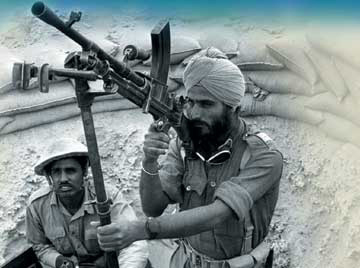India and the British war effort, 1939-1945
Historian article

India was vital as a source of men and material for the British in the Second World War, despite the constitutional, social and economic issues which posed threats to its contribution.
Leo Amery, Secretary of State for India 1940-5, wrote to Churchill, 8 April 1941: ‘My prime care had naturally been the expansion of India's war effort.' Sir Stafford Cripps, Lord Privy Seal, February - October 1942, in a Cabinet Memorandum of 2nd September 1942 noted: ‘How can we make India the most useful... for the rest of the war... our aim must be to get the maximum support for the war effort, militarily and industrially, from the greatest possible number of Indians.'
British interest lay in getting as many Indian troops as possible, though as the number of recruits increased so did doubts as to their calibre, loyalty and possible political commitment. India's army rose from 75,000 to 2,500,000. Early in the war India sent troops to Egypt and Malaya. By the end of 1941 900,000 were under arms, including 300,000 in the Middle East, Iraq and Malaya. Recruits came in at a rate of 50,000 a month. Indian troops had distinguished themselves in the desert campaign of 1940-1 and were to fight in that area under Wavell, Auchinleck and Montgomery. 90,000 Indians were involved in the capitulation of Singapore...
This resource is FREE for Historian HA Members.
Non HA Members can get instant access for £2.75

